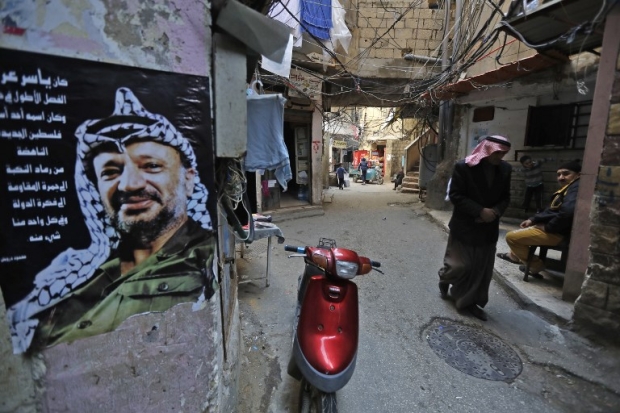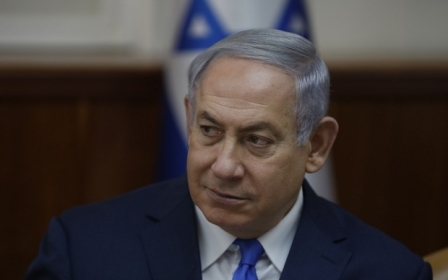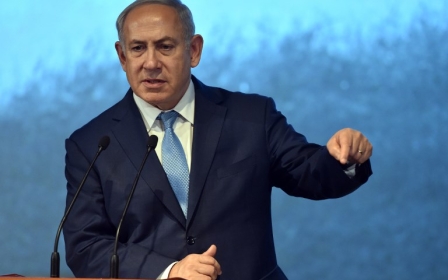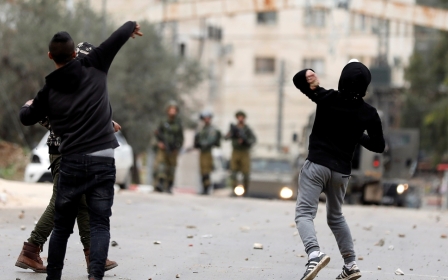Netanyahu’s corruption crisis: The Palestinians will pay

As a veteran Israeli journalist who has been writing about Palestinians almost since the end of the 1967 war, I want to bear witness that in recent weeks, the Palestinians have been saying that their situation right now is the worst it has ever been.
And it just deteriorated further in the aftermath of the political earthquake provoked by the Israeli police recommendation that Benjamin Netanyahu be charged with corruption. The shakier Netanyahu’s standing, the more he will have to rely on his traditional base: the right wing and the settlers. And the price will be paid by the Palestinians. To explain the relationship between Netanyahu and the Palestinians, we must go back to an episode from his past.
At a certain meeting in Jerusalem between Israelis and Palestinians some years ago, the Israeli poet Avoth Yeshurun (the pen name of Yehiel Perlmutter), stood up and addressed the Arab poet Hanna Abu Hanna.
'Just a little'
Yeshurun explained that he had come as a pioneer to the land of Israel, after persecution in Europe, to build a new Jewish society, a just society. He spoke at length of his discovery of an Arab society and culture which for hundreds of years had been the vanguard of world civilisation. “You, the Arabs, are big and strong,” he said.
“You had the first medical schools in the world; you introduced algebra to Europe along with the decimal system and the zero; you reinvigorated Aristotelian philosophy; you led the world in art, poetry, science, geography and astronomy, and you rapidly conquered the vastness of the East and parts of Europe.”
'What do you mean, move over a little? What little? I was born in Jaffa and my entire family has lived there for hundreds of years, and I did not move a little, I moved quite a lot, I moved completely. We are refugees. We have lost everything'
Yeshurun looked at Hanna Abu Hanna and shouted, “Here is what I ask of you: move over a little, just a little. You rule from the western ocean (Morocco) to the Arabian Gulf, 300 million people, give us a little place for ourselves, move over a little, just a little!!!”
I remember that encounter very well because the next speaker was an unknown young Arab who stood up to face Avoth Yeshurun and said, in effect: what do you mean, move over a little? What little? I was born in Jaffa and my entire family has lived there for hundreds of years, and I did not move a little, I moved quite a lot, I moved completely. We are refugees. We have lost everything. The house and orchard are gone, the family is scattered in all directions. That’s a little?
Weak - and strong
Among Palestinians I have known, there was always a tension between their affiliation as Arabs and their affiliation as Palestinians. As Arabs they belong to a huge, powerful, and wealthy nation, but as Palestinians they are weak and powerless. We recently marked 100 years since the issuance of the Balfour Declaration (November 1917) which in Palestinian chronology is considered the start of the conflict between Palestine and Eretz Yisrael.
Yasser Arafat was frequently asked what had caused the Palestinian problem and he always had the same answer: 'We were betrayed by the Arabs'
And throughout that century, the Palestinians continually sought the help of the big and powerful Arab world in their struggle against the Jewish Yishuv (pre-state) and against Israel. Arab countries did try to help the Palestinians. There was an attempt during the Arab Rebellion of 1936-39 and of course the wars of 1948 and later 1967 and October 1973. But all these attempts failed.
Yasser Arafat was frequently asked what had caused the Palestinian problem and he always had the same answer: “We were betrayed by the Arabs.” Arafat thought that the Arabs had betrayed the Palestinians when they signed the 1949 Armistice Agreement with Israel, and betrayed them again when they did not allow the Palestinians to continue their popular struggle against Israel.
He himself sat in jail in Egypt when he was a student in Cairo. Later he was jailed in Lebanon, he sat in prison in Syria (1966), and he was persecuted in Jordan during Black September in 1970. The reason was always the same: Arafat and his Palestinian loyalist nationalists demanded that the Arab states help them to fight – and for a long time now, the Arab rulers have refused.
The “Arab betrayal” of the Palestinians continues to this day – more than ever. As an example, take Egypt, the biggest and strongest of the Arab states and the one that has fought on behalf of the Palestinians more than any other Arab country has done. The regime in Cairo under General al-Sisi is in a very bad way. Egypt’s population today is nearly 100 million. Economic problems are unparalleled.
Once in Cairo president Sadat told us, a group of Israelis, that he understood Israel’s security issues. “You are always afraid that the Arabs will attack you, but our fear is different; every day we fear that, by evening, we won’t have anything to eat.”
Apart from the dreadful economic challenge of feeding a hundred million Egyptians, the regime in Cairo is under threat from extremist Islamic groups. IS is active in the Sinai Peninsula; lately they mounted an attack on a mosque west of El Arish and killed more than 300 worshippers. General Sisi has big problems coping with extremist Islam.
Under these circumstances, I can imagine Palestinian President Mahmoud Abbas (Abu Mazen) arriving for a meeting in Cairo with Sisi and telling him: You have to help me. The Israelis have built another 50 housing units in their Ma’ale Adumim settlement and perpetrated expulsions and demolished the homes of dozens of Palestinian families, and a soldier arrested a girl in Nabi Saleh near Ramallah…
The military and intelligence cooperation between Israel and Egypt is better than it has ever been. Israel helps Egypt in its war with the Islamic extremists in the Sinai
In a somewhat outlandish imaginary scenario like that, General Sisi is thinking that Abu Mazen has lost his mind. Egypt is confronting the life and death problems of tens of millions and Abu Mazen is telling the Egyptian leader about some mobile home park in some settlements. Those are the problems the Palestinians have?
Against this backdrop, the military and intelligence cooperation between Israel and Egypt is better than it has ever been. Israel helps Egypt in its war with the Islamic extremists in the Sinai. Egypt has become a real ally of Israel.
Things are similar between Israel and Jordan, where King Abdullah has problems coping economically with hundreds of thousands of Syrian refugees and fending off Islamic militants on Jordan’s borders with Syria and Iraq. The intelligence cooperation between Israel and Amman is a long-established and well-known fact.
Arab allies
And there’s more. There is also fairly high-level political cooperation between Israel and Saudi Arabia and the Emirates. Israel, the Saudis and the Gulf states have a common enemy: Iran. The Saudis are fighting the Iranians in Yemen – where the Iranians launch missiles at Saudi territory – as well as on Syrian and Lebanese soil. Thus a kind of strategic alliance has taken shape between Israel and the Sunni Arab states against Shia Iran. All under the sponsorship of American President Donald Trump.
In this Middle East, the Palestinians have no prospects. None whatsoever. No Arab country will help them, but may well harm them. Benjamin Netanyahu and his government know this. They can do whatever they please to the Palestinians. And so the right-wing Israeli government continues building and developing the West Bank settlements.
Sixty percent of the West Bank which, under the Oslo Accords, is controlled by Israel, has been almost entirely annexed to Israel. Almost weekly we hear of new laws or regulations that discriminate against Arabs in the West Bank and in Israel. Within the last week, for instance, a special law was passed according the university in the Ariel settlement the same status enjoyed by academic institutions inside Israel.
About Gaza, there’s almost nothing to say any more. The two million Palestinians in Gaza have been under siege for a decade; the Egyptians and the regime in Ramallah do very little to help them. The result is that Gaza is on the brink of a massive humanitarian disaster. Electricity works only four to eight hours a day. The water is not fit for drinking. Unemployment is nearing 50 percent. The economy is limited to the largesse of international aid organisations, led by the UN which headlined recently when Trump announced plans to slash its budget.
Not so fine
The situation of the Palestinians today is, as noted, worse than it has been for a very long time. A broken society mired in poverty and subject to the partial rule of the Palestinian Authority whose security forces have become, to a great extent, collaborators with Israel.
Many Israelis think that while the Palestinians may be in a bad way, we here in Israel are just fine. That’s how it is in zero-sum conflicts. But in our case, it’s not so.
There are liberal circles in Israel that think that we, too, are in a bad way. For some time now, various human rights organisations here have been functioning as the Netanyahu government’s most unwavering opposition.
The proof is in the regime’s fierce campaign of attacks against these NGOs. Breaking the Silence and its reserve soldiers openly critical of the army’s conduct in the West Bank, B’Tselem, Machsom Watch, the Association for Civil Rights in Israel, the New Israel Fund: all of them have existed for 20 years or more, but only lately has the Netanyahu government recast them as Enemy Number One.
Netanyahu enjoys broad international prestige. He is invited to world capitals from Delhi to Warsaw, from Moscow to Washington. His troubles are first and foremost domestic. Criticism is mainly from liberal circles, inside Israel, who cannot stand the reality of what is happening to the Palestinians. He always argues that all the criticism directed at his corrupt behaviour comes from liberal left-wing circles seeking to overthrow his government.
Even the police recommendation to charge him with corruption is viewed by Netanyahu as just another political attempt by the treasonous left to effect a coup. Hence the great fear is that the current situation will push him even farther into the embrace of the nationalist right and toward new steps against the Palestinians and his enemies on the left. As Netanyahu’s grip on power weakens, the Palestinians and the liberal left in Israel are liable to pay the price.
- Danny Rubinstein is an Israeli journalist and author. He previously worked for Haaretz, where he was an Arab affairs analyst and a member of the editorial board.
The views expressed in this article belong to the author and do not necessarily reflect the editorial policy of Middle East Eye.
Photo: Israeli Prime Minister Benjamin Netanyahu said his government was 'stable' and criticised the police investigation against him after detectives recommended his indictment for corruption, prompting calls for him to resign (AFP)
This article is available in French on Middle East Eye French edition.
New MEE newsletter: Jerusalem Dispatch
Sign up to get the latest insights and analysis on Israel-Palestine, alongside Turkey Unpacked and other MEE newsletters
Middle East Eye delivers independent and unrivalled coverage and analysis of the Middle East, North Africa and beyond. To learn more about republishing this content and the associated fees, please fill out this form. More about MEE can be found here.







